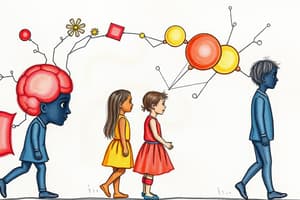Podcast
Questions and Answers
What do developmental psychologists study?
What do developmental psychologists study?
- Mental change
- Cognitive change
- Social change
- All of the above (correct)
What is continuity in human development?
What is continuity in human development?
The idea that human development is a gradual and continuous process.
What is discontinuity in human development?
What is discontinuity in human development?
The idea that human development is a discontinuous process involving separate stages.
An example of continuity is children becoming more skillful in ______.
An example of continuity is children becoming more skillful in ______.
An example of discontinuity is a child who abruptly graduates to thinking ______.
An example of discontinuity is a child who abruptly graduates to thinking ______.
Study Notes
Developmental Psychologists
- Focus on various areas of development: mental, cognitive, social, emotional, moral, and personal change.
- Investigate interactions among these changes, leading to complex developmental outcomes.
Continuity
- Represents human development as a gradual and continuous process.
- Individuals enhance and build upon previously acquired knowledge and skills over time.
Discontinuity
- Describes human development as a series of distinct stages.
- Knowledge and behaviors emerge abruptly rather than gradually, marking clear transitions.
Examples of Continuity
- Skills in thinking, talking, or acting improve in a consistent manner, similar to physical growth (e.g., increasing height).
Examples of Discontinuity
- An observable shift in cognitive abilities; for instance, a child moving from literal thinking to abstract reasoning suddenly.
Studying That Suits You
Use AI to generate personalized quizzes and flashcards to suit your learning preferences.
Description
Explore the concepts of continuity and discontinuity in human development. This quiz delves into how developmental psychologists study various areas of change and the interactions that lead to complex developments. Test your knowledge on key definitions and their implications in psychology.




